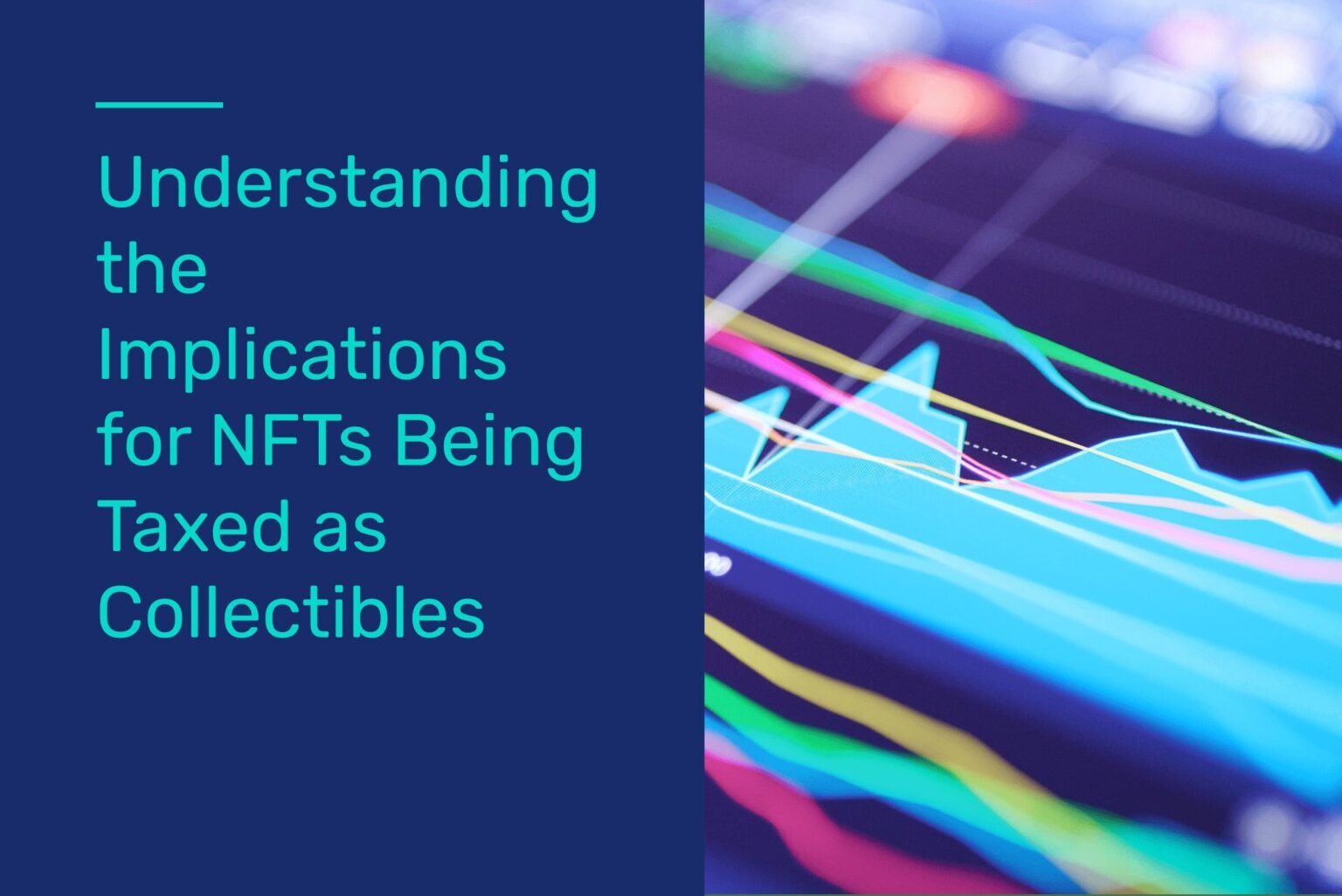The IRS seeks public comment on proposed nonfungible token tax treatment
The US Treasury Department and the Internal Revenue Service (IRS) issued a notice seeking feedback on their proposed tax treatment of nonfungible tokens (NFTs) as collectibles under the tax code. This move marks an important step towards clarifying the tax implications of NFTs, which have grown in popularity and significance in the digital asset ecosystem over the past few years.
The notice is good news as it represents much-sought collaboration from regulators on digital asset questions. The digital asset space is evolving quickly and the industry is always anxious for communication or guidance from regulators. Here, the IRS and Treasury are taking a big step by proactively reaching out for feedback and input from stakeholders before staking out a position on a type of asset they appreciate they may not fully comprehend. The effort here is well-intentioned and has been brewing for a few years.
First, a bit of background
In 2021, IRS Commissioner Rettig testified before Congress about the tax gap and the role digital assets may play in it. In his testimony, the Commissioner touched on NFTs, referring to them as collectibles. In the moment, the Commissioner’s statement was likely intended to be generic but collectibles, as a specific subset of property, have a special place in the tax code. As such, the Commissioner’s reference kicked off a tax question that many are still pondering two years later.
At the time of the Commissioner’s testimony, the artist Beeple had just sold a digital NFT image for $69 million at Christie’s. The artwork use case for NFTs seemed to control the conversation and, legally, artwork was something the tax code defined as a collectible.
But as many in the digital asset ecosystem understand, NFTs have many uses beyond just digital art, meaning the Commissioner’s reference could be seen as shortsighted because NFTs are likely not artwork in most scenarios. To their credit, the IRS and the Treasury Department also seem to appreciate this fact, resulting in the notice.
Taxation of Collectibles
As explained in the notice, collectibles are a particular type of property with special tax rules. The notice sets out a variety of tax provisions that implicate collectibles, but the most important one is that any gain received on the disposition of a collectible is subject to a higher tax rate than other types of property, including digital assets. So, NFTs that are collectibles would be taxed less favorably than other digital assets.
The tax code includes a specific list of items that constitute collectibles. That list is pretty short:
- Any work of art
- Any rug or antique
- Any metal or gem
- Any stamp or coin
- Any alcoholic beverage
Beyond the items above, the tax code also delegates to the IRS the ability to issue regulations identifying other tangible personal property as a collectible. To date, the IRS has never identified any other personal property as a collectible.
The statute’s specific reference to tangible personal property is interesting and possibly important to the IRS’s consideration of NFTs as collectibles. Notably, all of the property identified in the statute is tangible personal property. And Congress’s reference to tangible personal property in its delegation to the IRS may indicate some intent that collectibles, for tax purposes, always need to be tangible.
The reality is unknown, but the IRS seems to be treading carefully in the notice as it is looking to craft guidance on the issue.
NFTs and the IRS’s approach
As explained in the notice, NFTs are unique digital identifiers that use distributed ledger technology, such as blockchain, to certify the authenticity and ownership of a specific right or asset. Unlike other digital assets such as cryptocurrencies, NFTs are not fungible due to their unique nature.
To date, IRS guidance has focused on virtual currency or cryptocurrency as a subset of virtual currency. Virtual currency has been defined as assets that function as a representation of value and are readily convertible into fiat currency such as US dollars. NFTs, although backstopped by distributed ledger or blockchain technology like cryptocurrencies, have never fit squarely into this existing definition because they are not usually intended to function as a representation of value.
In November 2021, Congress passed tax legislation defining a digital asset as any property transacted on a distributed ledger that is cryptographically secured. This new definition was intended to include NFTs. The notice builds on that statutory definition and clarifies that NFTs fit into the property bucket for tax purposes while trying to further delineate when NFTs fit into the smaller collectibles bucket.
To be clear, the notice does not determine that NFTs are collectibles. The notice does, however, express the IRS’s and Treasury’s intent to issue guidance that would determine NFTs are collectibles in certain situations as detailed below. The notice, however, seeks feedback on the scenarios when NFTs would be collectibles and input from stakeholders as to whether the IRS and Treasury are properly understanding the various uses of NFTs.
The Look-Through Analysis
Acknowledging that one of the primary uses of NFTs is as a certification of ownership or right to some tangible asset, the notice touches on what the IRS describes as a look-through analysis. This aspect of the analysis is to properly characterize the NFT, not as property unto itself, but rather as an ownership or title document for some other physical asset.
In these situations, the notice seems to propose disregarding the NFT as distinct property and instead would focus on what the actual underlying property is. This makes some sense as most people don’t view the deed to their house or the title to their vehicle as distinct property from the house or vehicle.
In these situations, the notice says that the NFT’s treatment as a collectible will turn on whether the underlying property is a collectible under the tax code. For example, an NFT certifying ownership of a gem would be a collectible because gems are collectibles. Conversely, an NFT certifying ownership of land in the metaverse would not be a collectible because land in the metaverse is not a collectible.
The Artwork Question
Pivoting away from ownership, the notice tackles the artwork question, addressing situations where the NFT exists as a digital file or image that is artwork unto itself—not associated with some tangible piece of art.
In these situations, the notice indicates the IRS wants to treat artwork NFTs as collectibles. This approach seems reasonable because artwork is identified as a collectible under the tax code. With that said, this is where the tangible property question may come up. If the definition of collectibles in the tax code is intended only to cover tangible items, NFTs may not be covered. The answer is unclear but the IRS guidance can help clarify it, or the IRS may need to seek a statutory change from Congress.
What About Bundled Rights?
Finally, the notice references and asks for feedback on scenarios where the NFT functions in multiple ways, possibly bundling the ownership aspect with the digital art file aspect. You could have a scenario where one element of the NFT should be treated as a collectible while another element should not. Or, that the NFT entitles an individual to future rights that may or may not be considered collectibles. Acknowledging its uncertainty about all the factual permutations that might arise, the IRS is seeking input on how to address these situations.
Conclusion
Ultimately, it is good to see the IRS and Treasury moving forward with some guidance in this area. Clarity around the tax treatment will only benefit individuals and tax practitioners. The fact that the government is also reaching out for input so it can provide more effective and accurate guidance is a welcome sign as well. Developing a regulatory scheme that benefits the government and the ecosystem is best accomplished through collaboration with the broader ecosystem.
How Taxbit Can Help
At Taxbit, we are building industry-leading solutions for digital asset compliance. Our technology is trusted by some of the world’s largest regulatory agencies, accounting firms, and Fortune 500 companies with features such as:
- Scalability to handle tens of millions of transactions
- A controlled environment to support robust control frameworks such as ISO 27001 or SOC 1 & 2
- Audit support that is built with your auditors in mind
- Leading expertise from our team of IRS, AICPA, and Big-4 alumni
.png)


